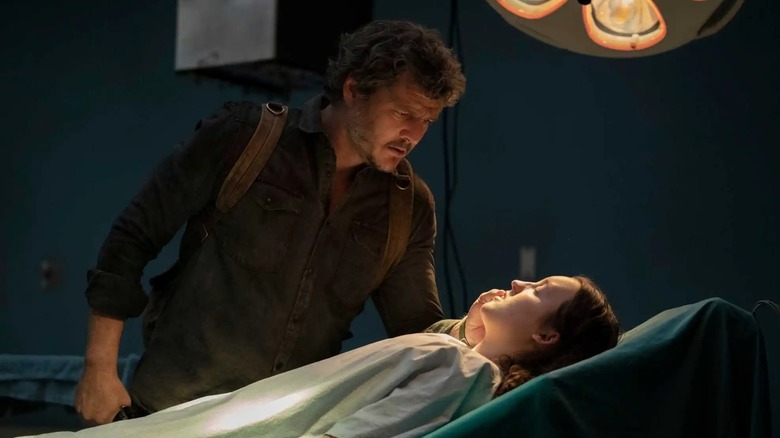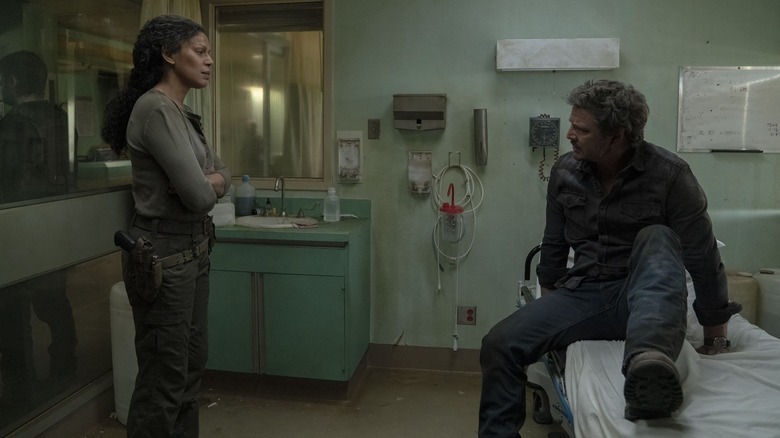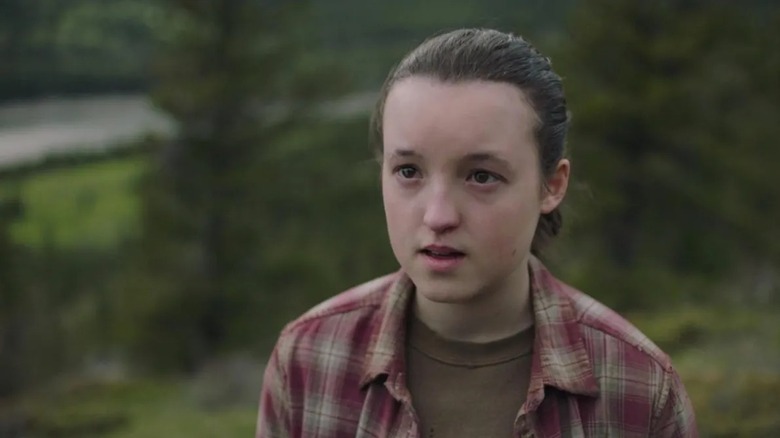The Last Of Us Finale Moment Where Joel Goes Too Far, According To The Creators
This post contains major spoilers for the season finale of "The Last of Us."
The moral dilemma centered in the ending of "The Last of Us" has solidified it as one of the most debated (and celebrated) video games for almost a full decade. With the season finale of HBO's adaptation, that legacy has found a second life, continuing to live on with brand new audiences.
After bonding with Joel (Pedro Pascal) and Ellie (Bella Ramsey) from summer to spring on their quest to find the Fireflies, their relationships are tested even further right at the end. Ellie's immunity — the reason Marlene (Merle Dandridge, who is reprising her role in live action) sent her on this journey in the first place — is key to creating a cure for the Cordyceps infection, but the procedure is sure to be fatal. In one of the most provocative scenes of this story, Joel goes on a merciless, murder spree to save his surrogate child (a scene that I'd argue works better in live-action).
Is saving one life worth the damnation of the rest of humanity? Does Marlene's ends justify the means? Is Joel a heroic man and loving father, or is he a broken, violent man with selfish intentions? "The Last of Us" hasn't been afraid to imbue most of its story with darkness and light in equal measure, but in its final moments, it crucially robs us of any closure. Like any good work of art, it raises more questions than provides clear answers.
So, how does creator and showrunner Neil Druckmann feel about Joel? During the official HBO "Last of Us" podcast, for perhaps the first time, Druckmann admits there's a personal boundary that Joel crosses.
One last chance to do the right thing
Even after all the violence he commits, Marlene gives Joel one more chance to do the right thing in the parking structure. She begs him to see her perspective, that the entire future of humanity is at stake. But for Joel, stubborn and set in his ways as he is, his decision has already been made. "He shot her [Marlene]. She already can't chase him," Neil Druckmann said. "He's got the car, and he still goes back for her because he can't even take the chance that she will regroup, change her mind, and come after him."
No matter how deplorable, Druckmann always tries to make an effort to empathize with his characters and avoid casting judgment on their actions. As a parent himself, he wrote Joel with a piece of his own soul, which is exactly what a strong storyteller should do — but that doesn't mean there aren't any personal lines of justice for the creative. Druckmann elaborated:
"And that's the part where I think when people sometimes ask me like, 'Do you think Joel did the right thing or the wrong thing?' Like, for me, I always say, 'I hope I would have the willpower that Joel has in that same situation.' I don't think I would. Except for the Marlene part. To me, that's the part where he goes too far."
Why Marlene matters
It is far less emphasized in the HBO series, but Marlene has been Ellie's quiet and distant protector ever since she was born. As much as Joel wants to believe Marlene is blinded by her cause and doesn't understand the full extent of Joel's potential loss, she's probably the only one in the room that knows the full extent of it. In the season finale cold open, we are shown the details of Marlene's connection to Ellie's mother, Anna (Ashley Johnson, the original Ellie performer), and their lifelong friendship.
In that sense, I agree with Druckmann's argument that this is Joel's final turning point. Obviously, Joel's slaughter of the Fireflies is already crossing an indefensible line for some, but by taking an unconscious Ellie for himself and murdering the only other proper adult figure she's ever known, he's forcefully cutting her off from finding belonging outside of himself.
But for Joel, a hardened survivor, this is an act of self-preservation. "You'd just come after her," he justifies before shooting Marlene once again. Beyond this moment, there's no turning back.


